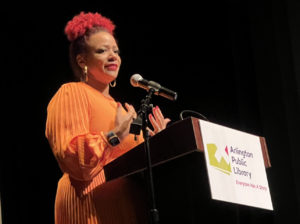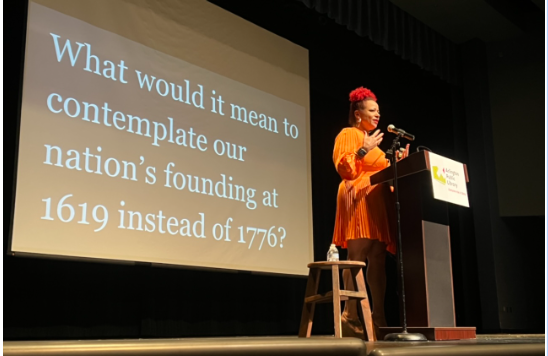Teachers should be “treated like the professionals that they are,” says Nikole Hannah-Jones, the Pulitzer Prize-winning journalist behind “The 1619 Project: A New Origin Story,” a book that expands on a controversial 2019 article of the same name published in The New York Times Magazine.
Some critics have sought to ban the work of journalism, block teaching based on the material and railed against it publicly and online. When Mike Pompeo was the US secretary of state, he tweeted that the work has US history “exactly backward.”
The book argues that slavery has been treated as an asterisk or marginal to American history. Hannah-Jones says historians and other contributors to the work explore how slavery is more “foundational” and deeply engrained in all areas of the nation as it is today.
“Our children deserve to learn the truth,” she told an in-person audience of about 500, and an additional 500 livestreaming via YouTube. The unrecorded event marked Banned Books Week and was hosted by the Arlington Department of Libraries at Washington Liberty High School.
A sit-down with SmartBrief

Before the lecture, Hannah-Jones spoke with SmartBrief about the challenges facing teachers, especially those who use the book and an aligned curriculum created by the Pulitzer Center. The curriculum is available for free online to teach US history from a perspective that differs from the narrative typically found in textbooks.
Efforts to challenge the material have failed to deter teachers from wanting to “teach challenging history in an age-appropriate way,” she said. “It has been very disturbing to me the disrespect that the (teaching) profession has had to undergo.”
The journalist experienced her own challenge in education in May 2021. The Board of Trustees at the University of North Carolina at Chapel Hill – her alma mater – did not approve her for a tenured position following conservative criticism of her work and her background outside of academia. The position was later approved and reoffered, but Hannah-Jones instead accepted a tenured post at Howard University in Washington, D.C., where she is the Knight Chair in Race and Journalism and is establishing the Center for Journalism & Democracy to train future journalists.
Speaking during the event about that chapter of her life, Hannah-Jones said “it was humbling, it was embarrassing, it was painful” and “a dark moment” that prompted her to take control of her own destiny and choose to go to Howard.
She urged event attendees to realize their own power and attend school board meetings and other forums to make their views heard about decisions being made “in your name” by elected leaders and others.
“These days require courage, and let me shout out to the educators and librarians who are exhibiting more courage than most of us right now,” she said, as the audience applauded. “Do we have their backs as they are fighting for our communities’ rights to learn? Are we showing them the support?”
Reacting to an attack on freedom
Diane Kresh, director of the Arlington Department of Libraries, echoed Hannah-Jones’ call for courage.
“Now is not the time to be risk-averse,” said Kresh, noting that teachers and librarians have always been at the forefront of standing up for freedom and the First Amendment.
Kresh told SmartBrief that the department’s events marking Banned Book Week have varied over the years, with Hannah-Jones being the first speaker hosted as part of the event. Kresh emphasized the seriousness of the issue, saying it is not a talking point or a manufactured event.
“The threat to freedom is real,” Kresh said, adding that while some people may think their own communities are safe from book bans and other events that put democracy in peril, “I think we have to be vigilant.”
Asked by SmartBrief about the origin of her interests in writing and journalism, Hannah-Jones smiled as she recalled growing up in a house of readers, often reading the news with her father, who subscribed to two daily newspapers. While attending high school in her hometown of Waterloo, Iowa, she complained that the school newspaper ignored Black students like her, who were bused to the campus as part of a desegregation program, she said..
“When I complained, a Black educator of mine, Mr. Ray Dial, said, ‘Join the paper, or don’t come here and complain anymore,’” she said, laughing at the memory. “So that’s what I did.”
A love of journalism led Hannah-Jones to investigative reporting at The New York Times Magazine, publisher of “The 1619 Project” article. About a year following publication, US Sen. Tom Cotton, R-Ark., introduced legislation to block federal funding from school districts that use the “The 1619 Project” in the classroom. The bill claimed that the federal government “has a strong interest in promoting an accurate account of the Nation’s history through public schools and forming young people into knowledgeable and patriotic citizens.” It identified “The 1619 Project” by name as being, among other things, a “revisionist account of history that threatens the integrity of the Union.”
While that bill failed, Hannah-Jones notes that “if a single work of journalism could challenge the very integrity of the union, the union wasn’t that strong to begin with.”
Bills aimed at bans, restrictions
The effort did spark more campaigns against the materials. Bans and restrictions on critical race theory as well as anti-racist, historical and other texts cropped up, with bills proposed or enacted in about two-thirds of US states. Hannah-Jones said the efforts attempt to promote so much fear that educators will censor their own classroom materials.
She recounted how the 2020 murder of George Floyd prompted widespread protests, support for Black Lives Matter and deep family discussions about race that explored the issues in “The 1619 Project.” She shared data, polls and election results that highlight the shift that took place just a year later amid fear campaigns suggesting that schools were teaching white students about CRT and blaming them for slavery and racism. Hannah-Jones said the idea was absurd, considering most US teachers are white women.
Hannah-Jones questioned how the history of Virginia can be divorced from slavery, given that Richmond served as the capital of the Confederacy. In the 1950s, the city engaged in “massive resistance,” a strategy by US Sen. Harry Byrd Sr., D-Va., in which many schools and one entire school district closed to avoid desegregation.
“So no, that is not a comforting history, but it’s the truth,” she said, before repeating: “And our children deserve to learn the truth.”
Trigie Ealey is an education editor at SmartBrief. Prior to joining SmartBrief in 2012, she was a veteran newspaper reporter and editor. She can be reached via email.
_________________________
Subscribe to SmartBrief’s FREE email ASCD newsletter to see the latest hot topics in education. It’s among SmartBrief’s more than 250 industry-focused newsletters.
